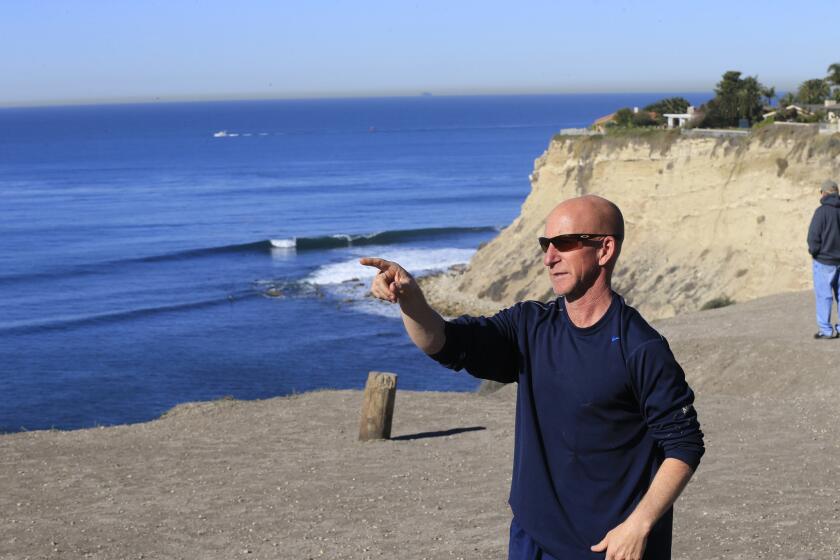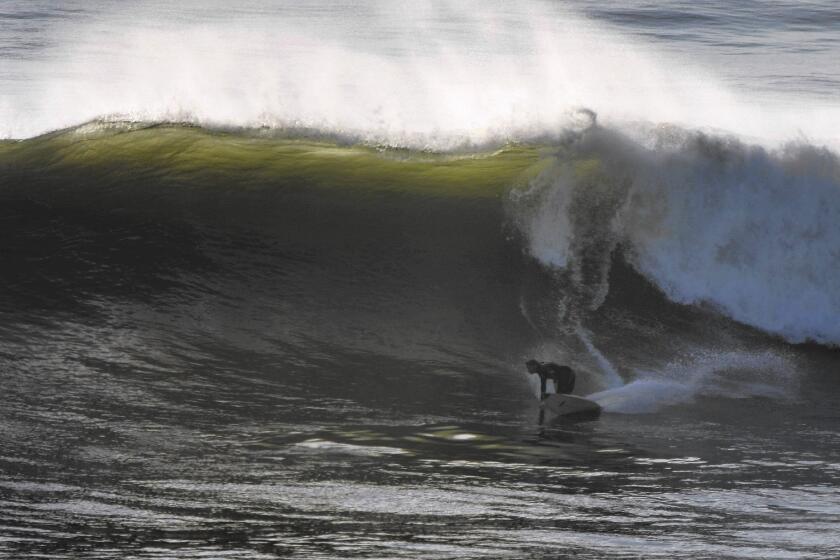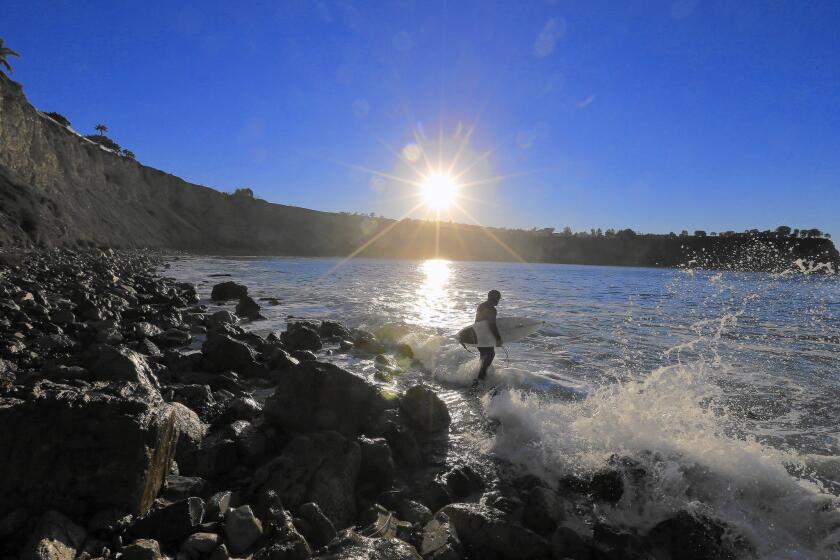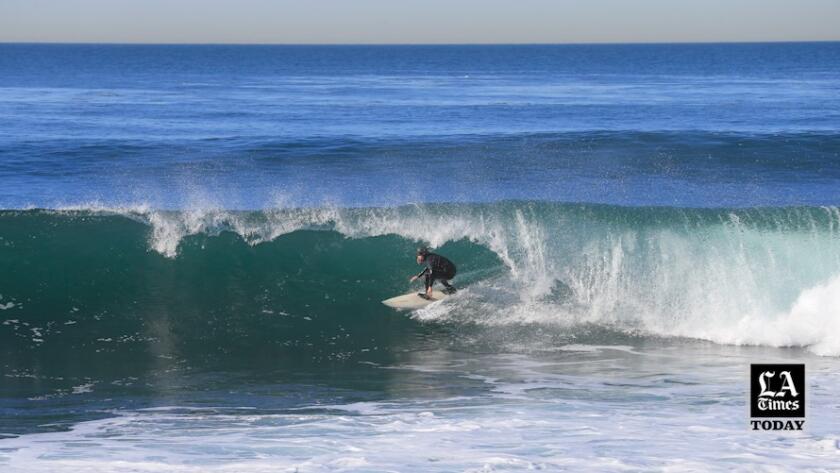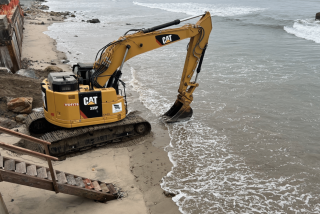Column: Is the reign of the surf thugs at Lunada Bay finally coming to an end? Looks like it
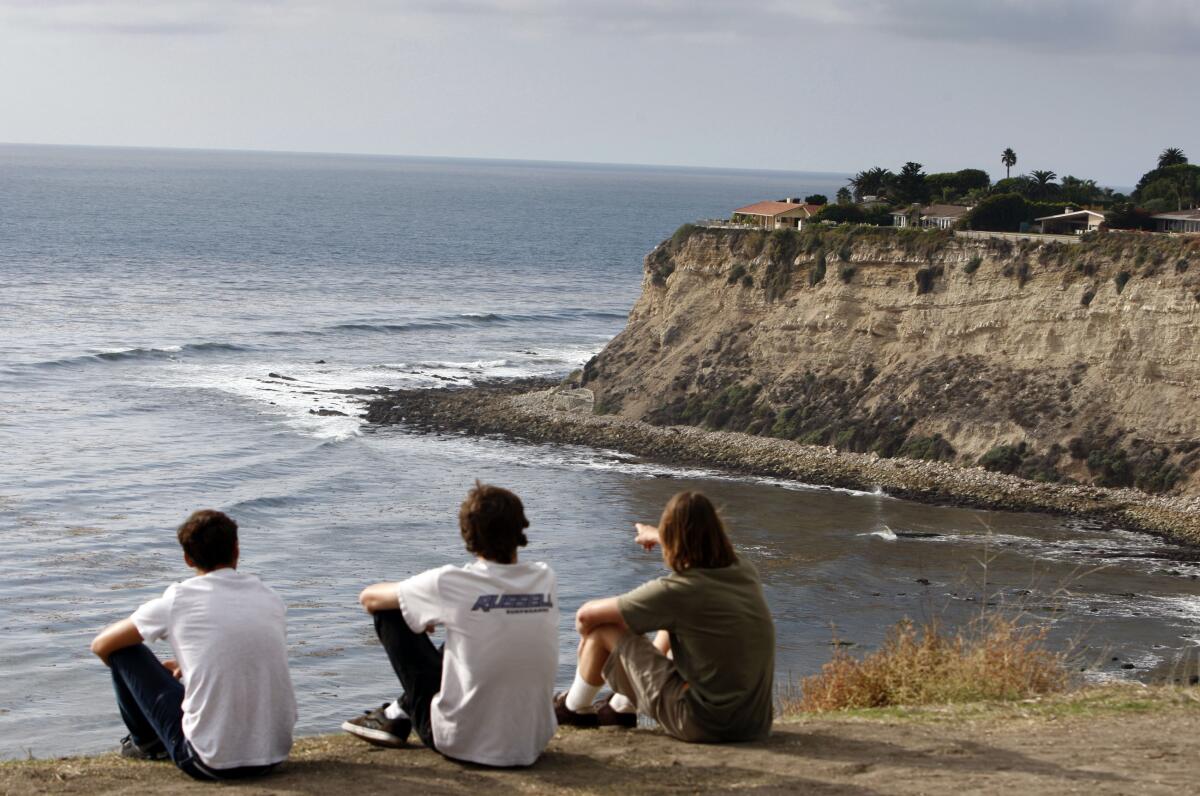
Thanks to a remarkable new ruling from a California appeals court, it looks like the days of the infamous Lunada Bay Boys surf clique may be coming to an end.
But first a little background:
For decades, this group of Palos Verdes Estates surfers — young and old — has terrorized outsiders in a largely successful quest to privatize a public beach that is considered by many to offer the most epic winter waves in California.
The tight-knit, multigenerational cabal has physically obstructed access to the steep trail leading down to the surf, thrown rocks, run surfers over in the water, cut leashes, stolen wallets and wetsuits, punctured or deflated tires, and waxed slurs onto car windows. Their obstruction is legendary; Lunada Bay is often described as the most “localized” surf break in the world. According to the city’s annual budget document, the population is 71.9% white, 22.9% Asian, 7.8% Latino and 0.4% Black.
“We’ve protected this beach for years,” one of the locals told my former colleague Tony Perry in 1995. “So we can have driftwood on the beach rather than Kentucky Fried Chicken boxes. If this place was ever opened up … the rocks would be marked with graffiti, and the beach wouldn’t be safe at night.”
There have been occasional organized forays by outsiders at Lunada Bay. In 2014, a Hawaiian-born surfer, Chris Taloa, invited surfers to join him for a peaceful paddle out on Martin Luther King Jr. Day. He testified that he was kicked underwater and one local who paddled out in blackface and an Afro wig told him, “You don’t pay enough taxes to be here.” He held a similar event three years later, but he is still angry about being denied access to such an epic break.
Peter McCullom, a member of the feared Bay Boys of Palos Verdes Estates, stood beside one of the best surfing spots in Southern California and explained the law of Lunada Bay.
Until recently, the Bay Boys seemed almost immune from repercussions, as local police and city officials gave little more than lip service to the sacred principle enshrined in the California Coastal Act: Our beaches and waves belong to everyone, not just the entitled white few.
In 2016, two fed-up attorneys with a passion for surfing joined forces to use the Coastal Act to take on the well-orchestrated antics of the surf thugs and the city that, in their view, tacitly encouraged the intimidation because it keeps outsiders away from the isolated community.
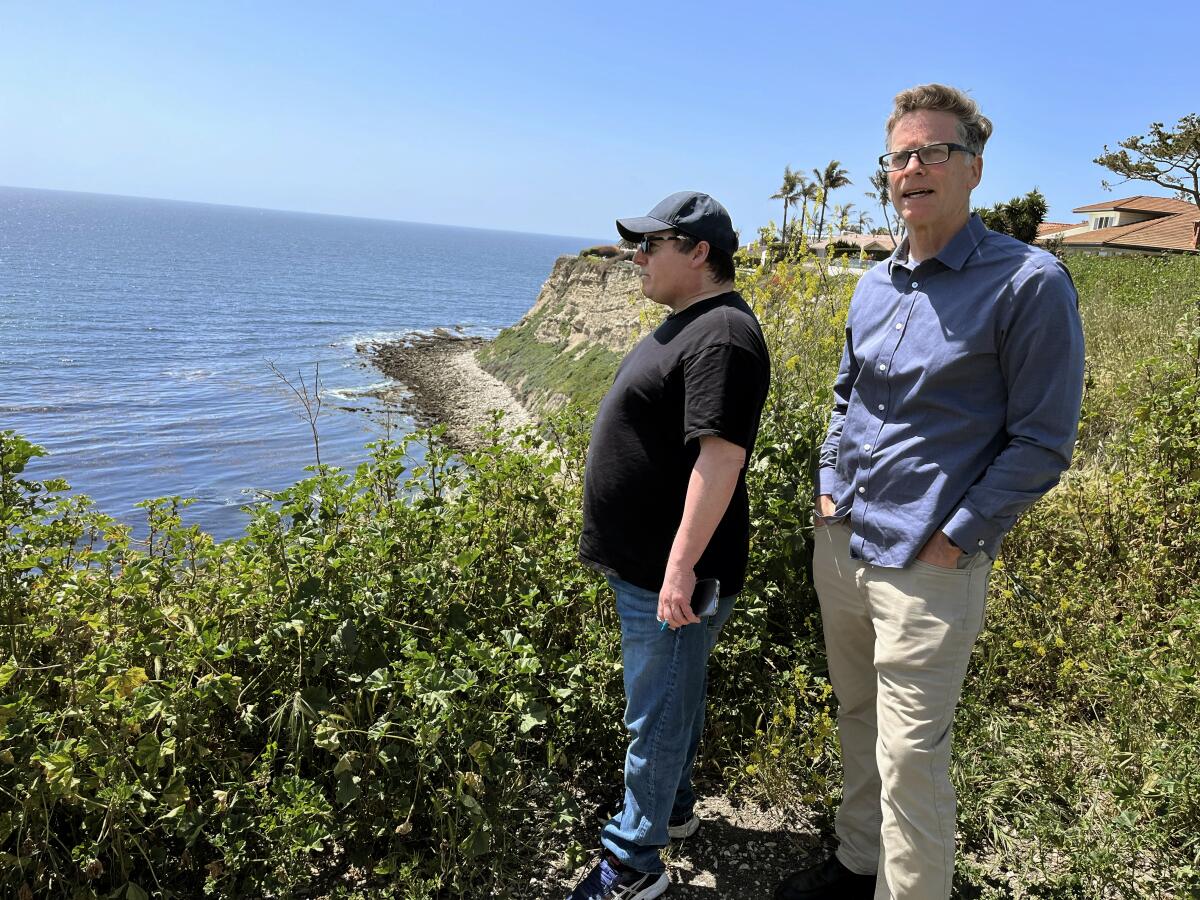
Attorneys Vic Otten and Kurt Franklin sued Palos Verdes Estates and the handful of locals they say have been responsible for the persecution. They represented two nonlocal surfers who had been exposed to hostility, threats and sexual harassment by the Bay Boys. I met with the attorneys a week ago, on the rim of Lunada Bay. The sun was out, the surf was flat and as we stood chatting, a few people with dogs played on the beach below us. The attorneys showered me with legal documents.
An El Segundo police officer who says he has been harassed by a group of surfers known as the Lunada Bay Boys of wealthy Palos Verdes Estates joined other alleged victims to file a class-action lawsuit on Tuesday.
One of their challenges, they said, was to prove that the Bay Boys were an organized group that had developed a systematic approach to keeping away outsiders, or “kooks.”
Thanks to a stroke of luck, the evidence they needed was forthcoming.
In 2017, alleged Bay Boy Michael Rae Papayans, then 28, was sentenced to jail for attacking and seriously injuring a 50-year-old man in a Dodger Stadium parking lot. Police had confiscated his phone, which found its way to Otten and Franklin, which led to other phones. “We got the hard drives of their phones,” Otten said. “They didn’t realize that just because you delete something doesn’t mean it’s gone.”
Around the time in 2016 that Otten and Franklin had filed their first Lunada Bay lawsuit in federal court, the city removed a decades-old rock fort, complete with a fire pit and shaded cabana that the Bay Boys had built (illegally) as their personal perch and clubhouse on the north side of the horseshoe-shaped bay.
But that, and some sporadic, increased police patrols, is about as much as the city seemed willing to do to counter the mayhem.
Jose Lopez, a 38-year-old fisherman from Bell, stepped gingerly to the bluff’s edge.
By 2020, after many twists and turns, the lawsuit ended up in state court, where a judge dismissed the city as a defendant, declaring that the Coastal Act was not applicable to the situation.
Meanwhile, the surfer defendants agreed to settle, either by paying (or having their insurance companies pay) thousands of dollars or agreeing to stay away from Lunada Bay for a year, or both.
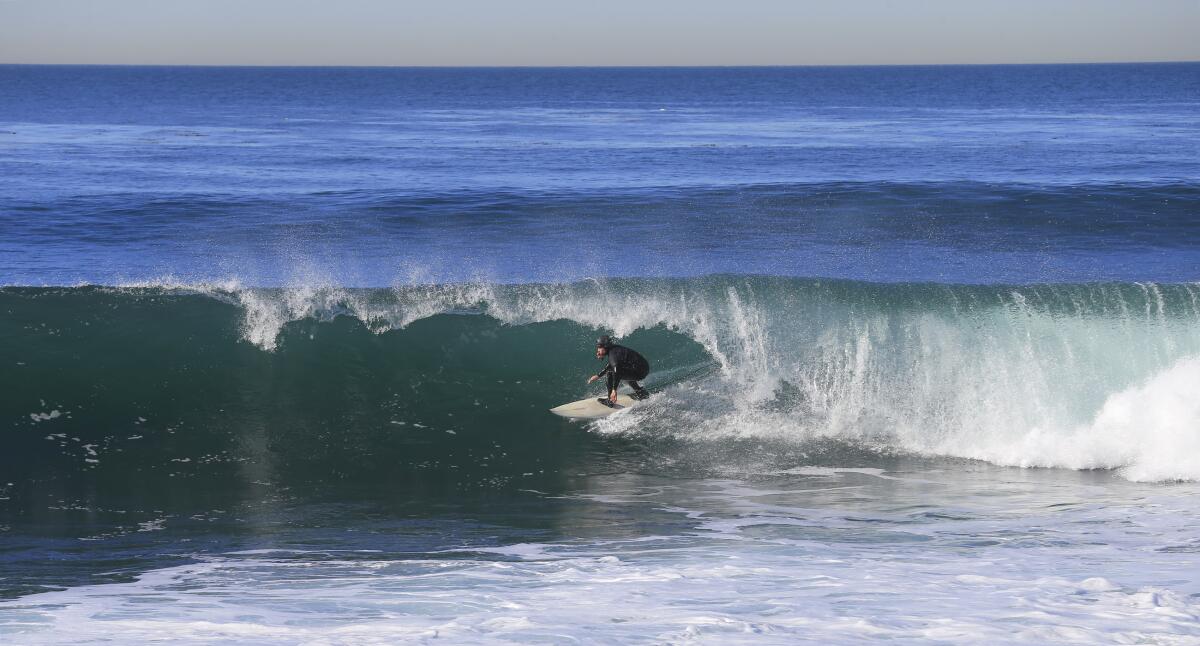
One of those defendants, Brant Blakeman, agreed to pay $90,000 and stay away for a year. Blakeman’s banishment ended March 31. I was curious about whether he planned to leave nonlocals alone from now on, but he did not return my phone call.
In February, California’s 2nd District Court of Appeal overruled the lower court. It said that the harassment meted out by the Lunada Bay locals could constitute a violation of the Coastal Act, and that the city, which owns the landward portion of the beach, might be liable for failing to stop it. The plaintiffs, wrote appellate Justice Laurence Rubin as he reinstated the lawsuit against Palos Verdes Estates, “sufficiently alleged an actionable conspiracy in which the city has participated.”
Otten and Franklin are elated. So are California Coastal Commission officials.
“You couldn’t ask for a better ruling,” Otten told me.
“It’s monumental,” added Franklin.
As harassment allegations increased against a surfer gang known as the “Bay Boys,” Palos Verdes Estates officials dismissed the problem as “urban legend” and discussed ways to avoid further public and media scrutiny, correspondence obtained by The Times shows.
“What I find to be so important about this case is that it addresses behavior, not just physical development,” Coastal Commission Executive Director Kate Huckelbridge said Thursday. In other words, throwing rocks or cutting a surfer off in the water, just like a gate across a trail, could be considered an illegal impediment to public beach and ocean access.
If the city, whose officials have in the past characterized the aggressive Lunada Bay localism as “urban legend,” is found to have violated the Coastal Act, it could face huge penalties, up to $15,000 a day.
This would put a serious burden on the city of 13,200 people. Besides property taxes, Palos Verdes Estates generates little in the way of tax revenue, as there are few businesses within its borders. “That’s the downside of not wanting anybody there,” Franklin said.
Palos Verdes Estates Mayor Jim Roos said by email, “The city remains committed to protecting the public’s access to our beautiful coastlines. We are hopeful for a resolution that recognizes that commitment.”
It’s fair to ask, exactly what commitment is he talking about?
Franklin and Otten told me they had offered to drop the lawsuit against the city years ago. The main thing they, and the Coastal Commission, wanted, they said, was for Palos Verdes Estates to put up signs indicating that Lunada Bay is public and open to all. They’d also like the city to install a park bench at the top of the cliff, maybe a stationary telescope for whale watching, a permanent water bowl for dogs, and a safer approach down the cliff to the water, perhaps using railroad ties as steps.
The city refused.
Meanwhile, Taloa, who played a local surfer in the movie “Blue Crush,” told me he’s looking forward to the day the lawsuit is put to rest. He can’t wait to get back out to the break at Lunada Bay, and to invite once-excluded surfers to join him.
“As soon as it’s done,” he told me, “we are going to turn that place into Waikiki.”
Watch L.A. Times Today at 7 p.m. on Spectrum News 1 on Channel 1 or live stream on the Spectrum News App. Palos Verdes Peninsula and Orange County viewers can watch on Cox Systems on channel 99.
More to Read
A cure for the common opinion
Get thought-provoking perspectives with our weekly newsletter.
You may occasionally receive promotional content from the Los Angeles Times.

